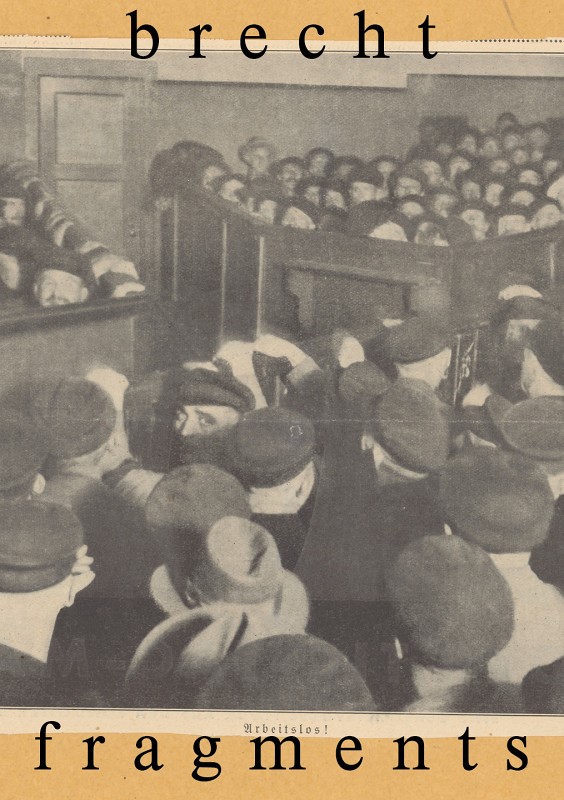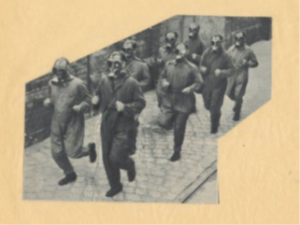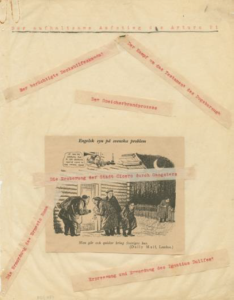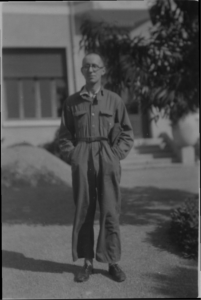Fragments of a giant of European Modernism

On 25 April our recently retired German tutor, Tom Kuhn, broadcast an edition of ‘In Our Time’, hosted by Melvyn Bragg and devoted to the life and work of the German poet and playwright Bertolt Brecht – who has been the focus of Tom’s research. The programme can be heard by clicking here. Below, Tom describes his current project, a major exhibition in London this summer, also devoted to Brecht.
brecht: fragments
at: Raven Row, Spitalfields
between: 15 June and 18 August 2024
Exhibition open Wednesday–Sunday, 11am–9pm
Performances at 3.30pm and 7pm, until 28 July
To reserve a free ticket, email: brecht@ravenrow.org to reserve a free ticket.
This exhibition will be the first dedicated to the visual production of legendary German playwright Bertolt Brecht (1898–1956). It features original material from the Bertolt Brecht Archive in Berlin, over one hundred items, most of it never-before exhibited, alongside performances of a set of scenes from his early unfinished plays.

A detail from Brecht’s Journal 24 August 1940.
Throughout his working life, Brecht cut out and organised visual material from sources ranging from newspapers and magazines to labels and packaging. He accumulated images to inform his theatre, from medieval paintings and Chinese theatre to contemporary clothing and industrial production, and also recorded social and political events and their actors – politicians, soldiers, workers and people on the street – in a collage project that played out across notebooks, journals and manuscripts. Brecht’s dramatic works were often constructed in fragments of text, cut out and reorganised as montages on large sheets of paper. Brecht called it ‘Klebologie’ (cut-and-paste-ology). The German word Montage itself refers not only to the artistic practice, but also to mechanical assemblage: a Monteur is a mechanic or ‘fitter’. Brecht clearly liked that association. Alongside a selection of montages and cut-and-paste-scripts, the exhibition will display original manuscripts, made by Brecht while in exile, that document the devastation of the Second World War. They will include War Primer, Brecht’s image-poem essay about war under capitalism, alongside other little-known visual creations.
Twice a day throughout the exhibition, actors will lead visitors through Raven Row, a stunning space in an C18 onetime Huguenot silk merchant’s house, performing dramatic fragments from four of Brecht’s unfinished plays from the 1920s, showing how montage and snapshot techniques played a crucial part in his conception of playwriting. Audiences will be asked to consider class conflict and poverty in The Breadshop, the excesses of stock trading in Fleischhacker, a man-made apocalypse in The Flood and a tank crew deserting the front line in Fatzer. Sets for these performances will further animate Brecht’s archive, reproducing his writing about the plays as well as research material he gathered to inform them, and revealing the profound role that visual conceptualisation played in his creative and political thinking.
brecht: fragments is curated by Phoebe von Held, in collaboration with Tom Kuhn, Alex Sainsbury, and Iliane Thiemann from the Bertolt Brecht Archive at the Akademie der Künste, Berlin, to whom we owe an enormous debt of thanks.
Raven Row – 56 Artillery Lane, London E1 7LS – is a registered charity number 1114350 and company limited by guarantee number 5789471.
https://ravenrow.org/exhibitions/brecht-fragments
You can read about the exhibition in the Guardian here.


